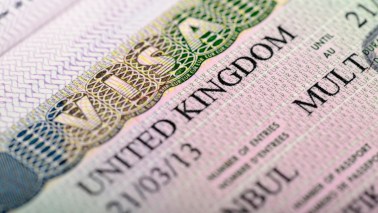John Edmunds was, with Neil Ferguson, one of the main advocates of lockdown but has been remarkably silent about how this theory held up against the results. But he does, still, pop up to attack those who were sceptical of his old advice. Chief amongst them was Rishi Sunak, his target today.
The Observer discloses that ‘a leading scientist’ has attacked Sunak for the work he did trying to repair the damage of lockdown on commercial activity with the Eat Out to Help Out scheme. That scientist was, of course, Edmunds, back to his old tricks using his position on Sage (which has still not been disbanded) to attack ministers who disagreed with him.
Speaking to the Observer, Prof John Edmunds of the London School of Hygiene and Tropical Medicine, who was a member of the Sage committee of advisers to ministers and who has submitted written evidence to the inquiry, said the controversial Eat Out to Help Out scheme – which gave people discounts for eating in restaurants and pubs – was never discussed with scientists. If we had [been consulted], I would have been clear what I thought about it,” said Edmunds. “As far as I am concerned, it was a spectacularly stupid idea and an obscene way to spend public money… We were asked questions and gave scientific answers but we didn’t know what strategy was being discussed by the government. It was written by them and we saw it the same day that the press saw it. They never said: ‘Here’s the strategy, what do you think of it?
Was it so bad that Edmunds was not consulted? And is it so obvious that the £840m scheme was bad? It cut the number of furloughed workers in the sector by 38 per cent, pushing economic activity up 70 per cent (inflation was also down). Sunak’s wider aim was to kickstart a consumer confidence recovery and replace the Cabinet Office’s ‘stay at home’ fear messaging with a different motif: ‘live without fear’ as he put it. This earned him the enmity of those advocating for lockdown. At the time, a second wave was not envisaged. When one emerged, it wiped out Sunak’s work.
But the Observer editorial talks as if Eat Out to Help Out actually made Covid worse and says it ‘drove up new infections by between 8% and 17%, according to one [Warwick] study carried out a few weeks later’. Set aside Warwick’s own patchy record on Covid modelling: any rushed-out studies drawn would inevitably have large error margins. Better data is now available, from many sources.
The ONS ran a gold-standard infections survey which, while taking longer to compile, has no data to support the idea that Suank’s scheme incubated the virus. Or take Covid deaths, the most reliable metric. When the second wave arrived, it did so through much of Europe – including Italy, Germany and France. Unless we think Sunak’s restaurant-subsidy scheme rekindled Covid in those countries, then it’s hard to argue that it did so here.
But if John Edmunds is now back in action, commenting on Covid, he might want to tell us how he rates the models produced by his own outfit, the London School of Hygiene and Tropical Medicine. We have the actual data now. So: how does his advice hold up? We know that he's able to shift opinions (given how passionately he used to argue for the herd immunity). So: how would he rate his own advice?
At the time of the Omicron wave in Dec21, LSHTM gave us a range of blood-curdling scenarios for what would happen if Britain did not lock down again. Edmunds and his allies were straight out of the traps on 11 December publishing a breathless press release:
New modelling from the London School of Hygiene & Tropical Medicine (LSHTM) suggests the Omicron variant has the potential to cause a wave of transmission in England that could lead to higher levels of cases and hospitalisations than those seen during January 2021, if additional control measures are not taken.
By this time, evidence from South Africa had made it quite clear that the above was nonsense. Nonetheless, the lockdown bandwagon had started to roll again: the same people (Edmunds, Ferguson), the same drumbeat of Sage 'scenarios' with terrifying figures for how many would die if the government did not lock down. Sunak was in California then, on a business trip, but promptly flew back, demanded a Cabinet meeting and liaised with its members beforehand. They ruled out another lockdown. So then, finally, we would get a chance to judge Sage graphs against the actual.
The below graph shows the ‘scenarios’ of Edmunds and others at LSHTM vs outcome (in red). This forecast was from19 December 2021: when even more South African data had been released.
Just how did Edmunds get it so wrong? He never explained. Why was the Cabinet served such junk from Sage? What did it get wrong? There was never an explanation. Were the earlier Sage graphs - used to justify the three earlier lockdowns - just as dodgy? We have never been told. And the glacial pace of the Covid inquiry means we won't be told until all those involved have left their current jobs.
Covid was all about dealing with the unknown. Mistakes were inevitable and no one can be blamed for guessing wrong, given that everyone was guessing. Lockdown theory was just that: a theory, never backed up by any science. One of the basics of public health intervention is to hesitate to enforce what has not been proven. Sweden took this approach, rejected lockdown and now boasts fewer excess deaths (from all causes) than any OECD country that locked down. Might a lesson lie therein?
Science and public health would surely be better served if Prof. Edmunds and others who got it spectacularly wrong spent some time reflecting on why their models ended up at variance with reality. And also, on why they were (and remain) so confident that they were right.
If he'd like space to write about lockdown theory held up, given that we now a world of evidence, we can offer him as much space as he likes on this website. This matters: it's is not about a squabble over history, but about the future. A new pathogen may well be along soon and when it comes, much will depend on the right lessons having been learned.
PS The above is meant quite sincerely: the Covid inquiry will take years but journalism can step in meanwhile, carrying on the debate that the inquiry threatens to stall. So we'd be very interested in hearing serious contributions to the debate from any civil servant or academic. Anonymously, if needs be. Why did serious institutions - Warwick, LSHTM, Imperial etc - all get it so badly wrong? Why did the Cabinet Office not recognise or flag the size of the error margin? Why were the flaws in Ferguson's work not picked up in the peer-review process? Is it true that none of the Dec21 Sage assumptions factored in a behavioural response, a flaw that would also have corrupted all earlier Sage 'scenarios?' Throughout the pandemic, The Spectator was proud to work with academics who sought to keep alive the basic scientific process - test and learn - against an atmosphere of panic where those going against the orthodoxy were seen as malign. The Covid inquiry means there is, yet again, a gap in this market. As a publication, we stand ready to offer our platform to promote an exchange of ideas so lessons - even small ones - can be learned before the next pandemic strikes. Email theeditor@spectator.co.uk
This article is free to read
Subscribe and get your first month of online and app access for free.







Comments
Join the debate, free for a month
Be part of the conversation with other Spectator readers by getting your first month free.
UNLOCK ACCESS Try a month freeAlready a subscriber? Log in